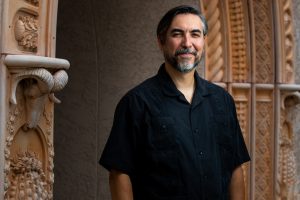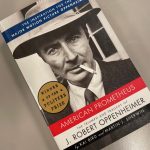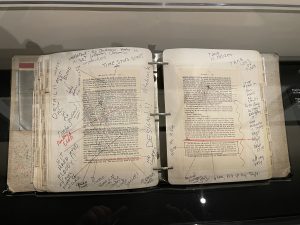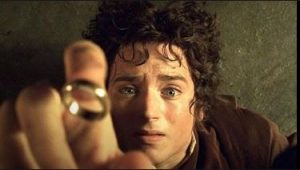This column, part of the monthly Heavy Metal Librarian series, originally ran in the Get Out! section of the Green Valley News on March 24, 2024. The series is authored by Charlie Touseull, Tween/Teen Librarian at Sahuarita Library.
I love movies almost as much as I love books. As a librarian and someone who goes to the movie theatre regularly, I love to see a critically acclaimed and well-received book brought into a visual medium and celebrated by an even wider audience on the big screen. The challenge of translating the written word to a visual medium is no small task, and when done right the film can become larger than the book itself.
The Academy Awards for 2023 were recently given out and, just like clockwork, people in homes, offices, and web forums began debating which films deserved to take home the Oscar, and asking the age old question... was the film or book better?
This is a discussion I love to have with patrons whenever I can. Working the front desk at a public library, I have these talks often about movies and books. History buffs often discuss the lack of historical accuracy in the screen adaptation of movies like Killers of the Flower Moon, stating how the filmed narrative and focus on specific characters did not reflect the historical depth, truths, and nuance depicted on the pages of the critically-acclaimed book. Others will say how much better the film version of a book is because the story conveyed more humanity and emotion through the actors, the sets, and costume designs. I enjoy it when authors and filmmakers discuss history in a way that can teach about our past failures and how to not repeat those mistakes in the future.
Adapting books into film has been around since the beginning of cinema, and over the years has produced some of the most beloved films and franchises around. The Wizard of Oz by L. Frank Baum was published at the very beginning of the 20th century, back in 1900, and later turned into a movie in 1939. Taking the classic characters in the novel and expanding on that fantasy using the latest technologies in filmmaking to completely transform the story and captivate audiences the world over was no small feat, but one that would set the bar high for the cinematic achievements to come.
Another such story that fits this book to screen model is that of the 1969 novel by Mario Puzo, The Godfather. This novel sold over 9 million copies in two years, spending almost two years on the New York Times Best Seller list. When the author agreed to let Frances Ford Coppola make a film of his book, they set upon dissecting the novel and dissecting the words in such a way that the characters would come alive on the screen. The author and the director meticulously co-wrote a screenplay that transformed the epic story of the Corleone family from print into a classic film that many consider to be one of the best ever made as well as one of the most quotable films of all time. The story combined with music, the sets, the clothes, and phenomenal acting is a completely different experience than reading, one that offers the viewer new and palpable ways to indulge in the storytelling.
This year the Oscar for best adapted screenplay was awarded to Cord Jefferson, a Tucson native and graduate of Canyon Del Oro High School for his work on American Fiction. Some of my friends and colleagues went to high school with Cord, making him somewhat of a living legend around Tucson now that he has achieved notoriety in such a completive profession. American Fiction was based upon the 2001 novel Erasure by Percival Everett. This film was hands down one of my favorites of the year next to The Holdovers.
I was working at a bookstore when the release of a new Harry Potter book was a cultural phenomenon. At the time I had no interest in reading about wizard children, but what made me very excited was to witness the throngs of families that would flock into the bookstore to buy the books, celebrate literature, and get excited about branching out to reading other classic works by authors all across the literary spectrum. One night when I was working late during the release party for Harry Potter and the Order of the Phoenix I was shocked to see how many kids of all ages were so stoked to read and lose themselves in a 900-page book. Never before had I witnessed so many kids getting simultaneously excited about reading and sharing that enthusiasm with their siblings and peers. Everything about that experience warmed my heart and made me excited to be working at an epicenter for that reading excitement and cosplaying chaos.
When the film versions of those books hit the theatre and then were later released on video, the kids that would come through the store seemed to be more excited about the book versions of those stories, but still reveled in the on screen magic of the cinematic experience. Kids asking their parents take them out to a bookstore or library for fun is something that will forever excite me.
A similar thing could be said when the Lord of the Rings novels were adapted to film by Peter Jackson in the early 2000’s. J.R.R. Tolkien novels were suddenly on the best seller lists, in the theatre, and a part of the popular consciousness, winning four academy awards in 2002, 48 years after the first novel in the trilogy was published. It was truly a labor of love and a dedication to the craft that allowed these magnificent books from the page to the screen.
That love for cinema and storytelling is what keeps people going back to the theatre, libraries, and bookstores year after year. It is that celebratory love for stories and extrapolation upon what makes us human that keeps us glued to the page and screen, anxiously awaiting what may happen next. It is that joy we get seeing the celebration of diversity in our society be mirrored to us, and the reveling in temporary escapism that makes us want to never let go of what is happening now and what could be in the future. Filmmakers and authors are never at a loss for tales to tell and adventures to be shared.
So, no matter if your vibe is Devil Wears Prada or Fear and Loathing In Las Vegas, what is important is that you keep reading and debating what is better, the book or the movie.
If you liked the movie you will probably love the book. Here are a few books that have been adapted into Oscar-winning films.





